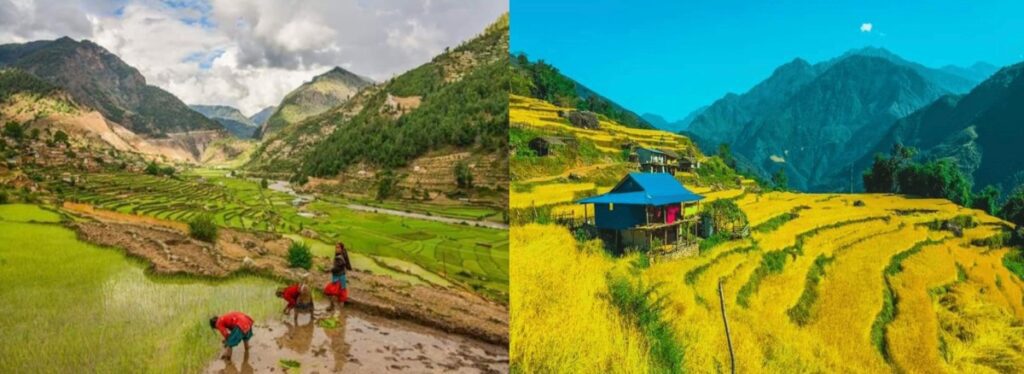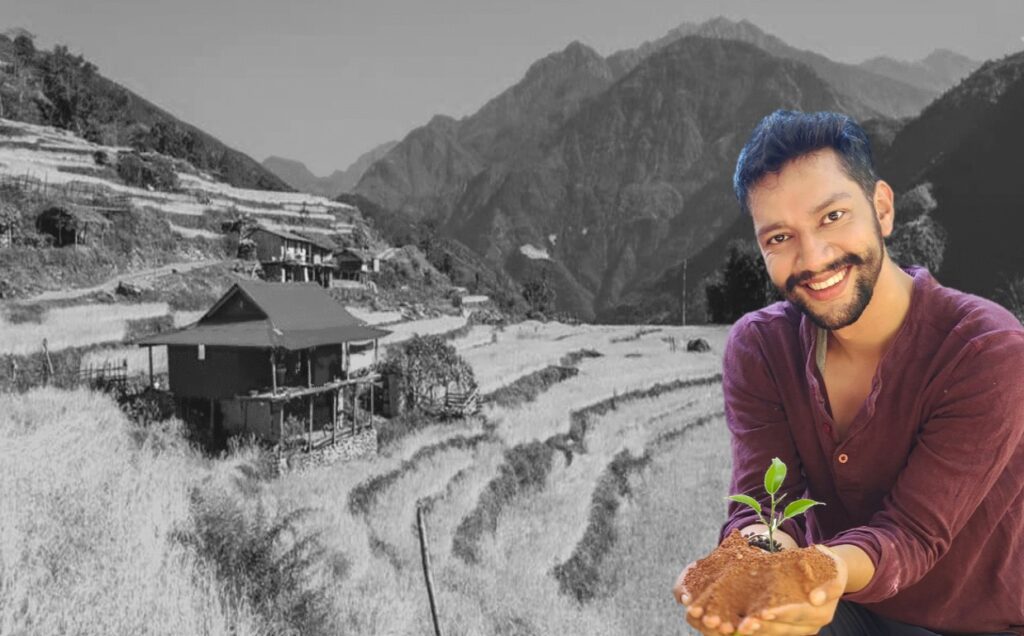Growing More Than Crops
Introduction
A vibrant community, thriving in the hills of Sindupalchoak, Aarukharka, Nepal, where greenery meets mountains and a nearby river serenades the landscape. Families work together during the planting season, children play in the muddy soil, and laughter fills the air … This is Krishna Hari Dulal’s dream.
Surviving in the streets of Kathmandu, begging for four months, taught him lessons no book could teach. Today, Krishna is determined to serve youth in rural communities through organising Ashabhumi, a model farm that will inspire you to develop love for their home villages and farming work.
Surviving the Streets of Kathmandu
It was in December 2006, somewhere in the streets of Kathmandu, when my mother’s epileptic fits caused people to gather around us. Some were staring, some even laughed, thinking it was a performance. I begged for help, but no one stepped forward. I felt helpless, holding my crying sister, while my unconscious mother lay beside us. It was a freezing day, and we had no warm clothes. The bright lights, bustling streets, and lively crowds were new to us, and we didn’t know where to go. We were lost, with despair in our eyes, making the street our temporary home.
Childhood Roots in a Traditional Village
you might wonder, how did it get so far? Let me take you years back into a little village 50 Km north of Kathmandu. My father had 3 daughters, but he wanted a son. People in our society believe that a son brings blessings to the family.
A Life Upturned: From Village to Kathmandu
At the age of 37, he married again, this time my mother who was only 14 years old. And guess what, then his first wife delivered a baby boy. And shortly after, I was born, and three years later, my sister was born.
Growing up in the village, I spent my childhood helping my parents on the farm. And while listening to the stories of my grandfather, I learned about the importance of kindness and humility. Life was simple, and I experienced the beauty of rural living firsthand.
In the year 2006, my mother experienced seizure attacks and she was behaving abnormally. Instead of bringing her to a hospital, my family sought help from a shaman. When the villagers observed that despite the shaman’s treatment her condition became worse, they believed it was caused by an evil spirit and wanted to cast her out. My father brought us to Kathmandu where he abandoned us in the streets.
There we survived for four months, begging for food and enduring sleepless nights. Hunger was a constant companion; sometimes older street children stole our collected money.
But one day, we heard about ROKPA, an organization that transformed our lives. My sister and I were given a place at the children’s home and after the founder witnessed my mother’s seizures, ROKPA also provided medical care and they helped her to start a small tea shop. Unfortunately, after three years due to harassment from drunk people, she had to close the shop.
ROKPA: Transforming Lives and Providing Hope
In 2010, during a school break, I returned to the village with my mother and asked my family for a piece of land where my mother could live and farm. She got the land and began farming on her own. During my school holidays, I would join her and help in the fields. She taught me how to grow different crops and vegetables. I loved working in the fields and assisted her whenever I could.

Return to the Land: Farming in the Village
In 2015, when I just finished high school, a massive earthquake hit Nepal. Our house, like most houses in other communities, completely collapsed. Seeing the damage everywhere, I decided to take a gap year and started to volunteer in rural communities and the rebuilding process. I could see the resilience of the people despite their numerous hardships. I also joined them in their fields, learning about agriculture while helping them.
I used to take pictures and one made it on a magazine cover. Because of this, I was offered a scholarship opportunity to study photography in the US. However, I declined as I was determined to work with rural people in Nepal. I shifted from engineering to Development studies and to give back, I worked part-time for ROKPA. I worked so hard that this affected my health and I got hyperthyroidism, an overactive thyroid that impacts your overall health from metabolism to mood swings and weakness. To recover, I returned to my home village. Nature and the work on the farm helped me to heal.
To learn more about farming methods, I started to travel through different districts and engaged with rural communities while working on their farms. This brought me immense joy and satisfaction.
Back then, I witnessed youth who felt the urge to migrate abroad leaving their families behind. Unlike myself, those youngsters didn’t see any value in farming, despite its crucial role in providing food to all. This increased my desire to promote the value of organic farming as the Use of chemicals has degraded the farmland already and the less output and income is pushing the farmers from their land.
Cultivating Food, Cultivating Dreams
I yearn to cultivate my food and lead a meaningful life, sharing this message with others who dream of tranquility. While money matters, I prioritize a purposeful existence by serving humble grassroots communities that contribute to our sustenance.
It’s planting season for rice and more than 20 community members are in the field to help cultivate one of the farmers’ lands. While some men are plowing the field with an ox to loosen the soil, women are cultivating the crops, and children are playing in the muddy ground. Some help with passing plants, Laughter fills the air, and harmonious songs are sung by the young farmers that resonate like nature’s own melody. The smell after the rain is refreshing and adds reassurance to the hearts of the farmers.
Aarukharka’s Past Glory and Present Challenges
This is what was seen in the past in the rural village of Aarukharka which is high up in the hills of Sindupalchoak surrounded by greenery and mountains, sometimes hidden by clouds. The river flowing nearby added music and community united in the harvest season. In the simplicity of their existence, the villagers found boundless joy ate from the earth’s abundant bounties.
And then, after years had passed, the young people disappeared from this land and the parents sat waiting. This land has lost its charm and is no longer as vibrant with life as it was before as the soil is becoming dry and infertile, and the young people are leaving their homes in search of opportunities elsewhere. There are no young farmers to farm together again like in the old days.
Growing More Than Crops – Introducing ASHABHUMI Farm: A Beacon of Hope
We hold a dream, of a village where youth and rural farmers can flourish on their ancestral land, cultivating with dignity and pride, living a life closely connected to the soil. We envision a place where the heart of the community is its youth, thriving in their homeland through farming.
Our organization, ASHABHUMI Farm, which translates to “hope through the land” in Nepali, is committed to transforming this dream into a reality. Our team comprises three professionals with expertise in soil microbiology and permaculture design, driven by a passion to revitalize the agricultural sector. We possess a four-hectare plot of land in the hills, currently lying barren and degraded, waiting for the dream to materialize.
“For additional information about Krishna and his fellow participants, please visit Participant 2023 ”
Listen and watch Krishna’s as well as 21 more inspiring dream speeches during kanthari TALKS, note the dates: 15 and 16 DEC 2023:
More details on www.kantharitalks.org




aha growing more than crops, love it. you are giving in to society more and to the land fertility more, and if you produce beyond, let it be, it is the universe blessing to the people through you